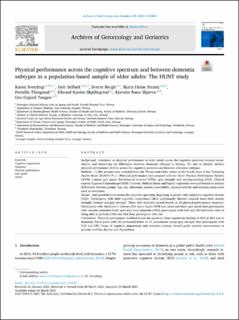| dc.description.abstract | Background: Literature on physical performance in older adults across the cognitive spectrum remains inconclusive, and knowledge on differences between dementia subtypes is lacking. We aim to identify distinct physical-performance deficits across the cognitive spectrum and between dementia subtypes. Methods: 11,466 persons were included from the 70-year-and-older cohort in the fourth wave of the Trøndelag Health Study (HUNT4 70+). Physical performance was assessed with the Short Physical Performance Battery (SPPB), 4-meter gait speed, five-times-sit-to-stand (FTSS), grip strength and one-leg-standing (OLS). Clinical experts diagnosed dementia per DSM-5 criteria. Multiple linear and logistic regression were performed to analyze differences between groups. Age, sex, education, somatic comorbidity, physical activity and smoking status were used as covariates. Results: Gait speed declined across the cognitive spectrum, beginning in people with subjective cognitive decline (SCD). Participants with mild cognitive impairment (MCI) additionally showed reduced lower-limb muscle strength, balance and grip strength. Those with dementia scored lowest on all physical-performance measures. Participants with Alzheimer's disease (AD) had a higher SPPB sum score and faster gait speed than participants with vascular dementia (VaD) and Lewy body dementia (LBD); participants with VaD and LBD had lower odds of being able to perform FTSS and OLS than participants with AD. Conclusions: Physical performance declined across the spectrum from cognitively healthy to SCD to MCI and to dementia. Participants with AD performed better on all assessments except grip strength than participants with VaD and LBD. Stage of cognitive impairment and dementia subtype should guide exercise interventions to prevent mobility decline and dependency. | en_US |

